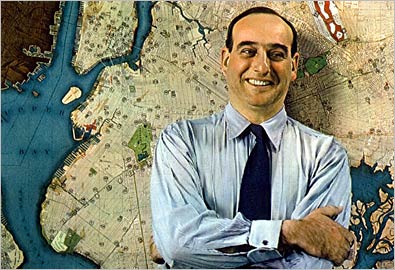The BEST: “The Power Broker”

The BEST: The Power Broker: Robert Moses and the Fall of New York
Author: Robert Caro
by David Wolkenfeld
Summary: This Pulitzer-prize winning biography of Robert Moses is the exquisitely written story of modern New York City and how it was shaped by one man who, despite never holding elected office, managed to leverage power to shape the city’s infrastructure and development for decades.
Why it is The BEST: Twenty years ago, before smartphones, or Waze, GPS, and even before Mapquest, a friend of mine navigated his way through a part of New York City where he had never before driven, using only the map printed in The Power Broker that illustrates the parkways, expressways, and other roads created by Robert Moses. The shape of contemporary New York, decades after his fall from power and death, is still largely the product of his imagination and leadership. And, to the extent that the car-focused infrastructure that Moses promoted in New York was a model for urban development and suburban sprawl across the United States, all of us are living in Robert Moses’ America.
But The Power Broker is not primarily a history of urban America. The Power Broker is a study of political power and how it can be created and leveraged and deployed. Moses, who never held any elected office, defied mayors and governors over the course of his career because he was able to use his appointed positions, first as Parks Commissioner, and then as Chairman of the Triboro Bridge Authority, as independent sources of political influence and power that allowed him to circumvent efforts to constrain his exercise of power.
Caro completed The Power Broker in 1974 and has spent the past forty years researching, writing, and publishing a monumental multi-volume biography of Lyndon Johnson. That project too is an exploration, not just of a pivotal individual and his influence on the United States and the world, but an examination of how political power is created, leveraged, and deployed.
Caro’s research and writing is characterized by an almost monomaniacal attention to understanding small details, leaving no page in the archives unturned, and going the extra mile to understand every facet of a story. Caro could not write about the construction of the Cross Bronx Expressway and the political controversy surrounding its route without conducting hours of interviews with the (mostly Jewish) residents of the middle-class neighborhoods destroyed by that construction project. And he couldn’t write about the destruction of those neighborhoods without conducting hours of interviews with the mostly impoverished African American tenants who moved into the remaining buildings of those same Bronx neighborhoods in the decade after the construction of the new highway. As shaped by Caro, the story of the Cross Bronx Expressway is a narrative of urban development, but it is also a poignant and tragic story of how tens of thousands of New Yorkers lost homes that they loved and a chilling tale of stable and thriving middle-class neighborhoods in the South Bronx that soon became a metonymy for inner
city blight because of Robert Moses’ power to overrule and override all political opposition to his master plans.
Perhaps more than anything else, The Power Broker, and Caro’s entire oeuvre, is “The BEST” because of its dramatic and quite beautiful writing. At 1,166 pages (plus acknowledgments, notes, and references) The Power Broker is a heavy tome. And yet, Caro shapes the narrative with such effectiveness that the resulting book is a thrilling page-turner. The Power Broker is a reminder that the stories of all human beings, the powerful and the powerless, deserve to be told, deserve to be told well, and that we are each morally accountable to even the unintended victims of our most noble dreams.
David Wolkenfeld is the Rabbi of Anshe Sholom B’nei Israel Congregation in Chicago.
This is the twelfth installment in TraditionOnline’s “The BEST” column, exploring exemplars of the best culture has to offer thinking religious people – click here for the series introduction and links to all entries in the series.
[Published on October 31, 2019]
